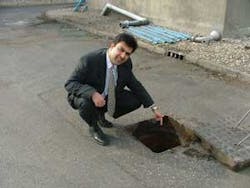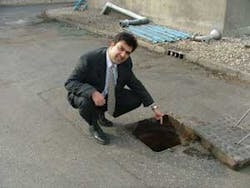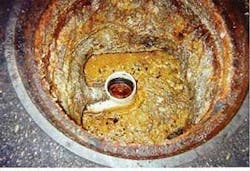Bioremediation system prevents drain backups at fast-food sites
Environmental Biotech’s Grease Eradication System saved more than £15,000 (US$ 29,000) for four McDonalds fast-food restaurants by reducing reactive service calls resulting from blocked drains during a trial period.
By Aziz Tejpar
Fat has become the enemy of water authorities throughout the world given the thousands of fat, oil and grease (FOG) related sewer spills that occur every year. In the United Kingdom, an estimated 55 percent of sewer blockages result directly from incorrect FOG disposal. Consequently, the UK water industry spends approximately £20 million (US$ 38M) per year to clean up and reduce the risk of sewer flooding.
But companies responsible for disposing of FOG tend to adopt reactive drain line management measures, simply paying for pump outs and related costs passed on by water companies. Often, little thought is given to how hard reactive call-outs hit a company’s bottom-line-profitability, or indeed the environment.
Installing grease traps and reacting to blockages is not enough. Encouraging those responsible to participate in preventative drain line management is desperately needed. For example, Environmental Biotech assumes the management of its clients’ drainage system so that the clients can focus on what they do best…run their businesses profitably. The company’s proactive approach is to solve clients’ problems before they occur; preventing a drain backup is far better than dealing with it after it has blocked, overflowed and caused major inconvenience.
An acclaimed joint Business Services Award presented to Environmental Biotech and the leading building design consultancy Maleon highlighted this point. The award positioned the drain line management programme as one that is making significant contributions to advance the field of public health engineering across the UK.
John Benton from Maleon’s public health engineering department commented: “Major problems occur when FOG build-up causes pipes to occlude, with solids attaching to the fat resulting in blockages and sewer overflows. With a large percentage of all sewer blockages in the UK caused by the accumulation of FOG, it was exciting for Maleon to successfully introduce a way of permanently alleviating FOG issues, which are traditionally dealt with on a reactive basis.”
When fat hardens; chunks break off and flow down the pipe and can jam in the machinery of underground pumps. That, to use a more digestible metaphor can cause a municipal heart attack, resulting in particularly nasty sewer overflows and expensive call outs.
John Benton added: “Our trials at four separate McDonalds sites from April to June 2005 proves that Environmental Biotech’s Grease Eradication System can make considerable cost-savings. In fact, McDonalds saved over £15,000 (US$ 29,000) through the reduction of reactive call-outs throughout the trials.”
Environmental Biotech installed its Grease Eradication System (GES) at all four McDonalds sites. The GES, relying on bioremediation, eliminated the waste grease and oil, safely and efficiently. Using billions of live vegetative bacteria that feed on FOG, it was automatically introduced into pipe work and drains via a dosing system.
Several 20-liter dosing systems, controlled by a timer mechanism, released the live vegetative bacteria routinely into the offending areas via plastic stilling chambers.
During each bi-weekly visit, a technician examined the dosing arrangements and replenished the bacterial solution, which digests the hydrocarbon-based compounds of the FOG, reducing it to carbon dioxide and water. This hugely reduced the amount of FOG entering public sewers, with discharge rates more than 100 mg/l below the standard discharge rate of 300 mg/l.
The results of the trials were so successful that they have already encouraged other commercial premises to follow suite. For example, trial results presented at Environmental Biotech’s most recent Grease Summit, attended by 50 top researchers, water company collection managers, and local government representatives, stimulated much interest and debate.
One of the main concerns arising from this summit was that the incorrect disposal of FOG is an issue that’s not going to disappear. Drain blockages resulting from FOG is an urgent problem given its high costs to the water industry. UK water companies can prosecute culprits disposing of FOG incorrectly, however the summit highlighted the preference for educating businesses on responsible drain line management instead of issuing fines.
Author’s Note
Aziz Tejpar is the managing director of the UK company Environmental Biotech. For further information please visit www.environmentalbiotech.co.uk


